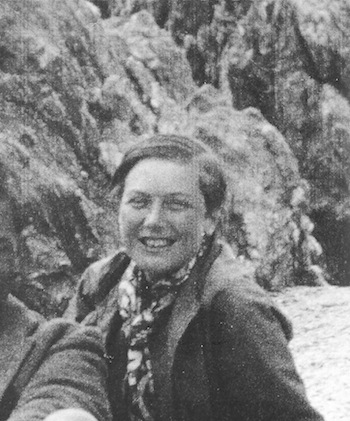

Queer Places:
University of Oxford, Oxford, Oxfordshire OX1 3PA
19 Cliveden Pl, Belgravia, London SW1W 8EX, UK
Cobbolds Mill, Monks Eleigh, Ipswich IP7 7JB, UK
 Dame Alix Hester Marie Kilroy, Lady Meynell, DBE (February
2, 1903 - 1999)[1] was the
first woman to enter the Civil Service Administrative Exam for UnderSecretary
(Trade) in 1925. She was given a desk at the Board of Trade, where she ascended to Under-Secretary and where she served for 30 years (aside from a brief spell at the newly formed Monopolies Commission). She retired in 1955. She marked her 95th birthday by publishing a new book What Grandmother Said (published February 1998), was the last of her writings. Her 1988 autobiography, Public Servant, Private Woman, charted her progress through government.[2]
Dame Alix Hester Marie Kilroy, Lady Meynell, DBE (February
2, 1903 - 1999)[1] was the
first woman to enter the Civil Service Administrative Exam for UnderSecretary
(Trade) in 1925. She was given a desk at the Board of Trade, where she ascended to Under-Secretary and where she served for 30 years (aside from a brief spell at the newly formed Monopolies Commission). She retired in 1955. She marked her 95th birthday by publishing a new book What Grandmother Said (published February 1998), was the last of her writings. Her 1988 autobiography, Public Servant, Private Woman, charted her progress through government.[2]
Alix Hester Marie Kilroy was born at Felixstowe, The Park, Nottingham, on 2 February 1903, the second daughter and second child in the family of four daughters and one son of Lancelot Kilroy. "A.K." or "Bay" as she was known to friends, was the daughter of a Surgeon Commander of the Royal Navy, educated at Malvern Girls' College and at Somerville College, Oxford, where she read Modern Greats and befriended Evelyn Sharp. Her unconventional relationship (started in 1922 without benefit of marriage until 1946) with Francis Meynell, a poet, book designer and founder of Nonesuch Press, was childless, although she was devoted to her husband's large family of nephews and nieces. Their home was 19 Cliveden Place, SW1, and they survived three near-misses during the Blitz. Alix records that she was terrified throughout this period. Marriage in 1946 bestowed, as the wife of a "K" (he was knighted that year), the title of "Lady", although this honorific was, technically, to be trumped by the DBE awarded her in 1949. At about the end of the Second World War, the couple acquired "Cobbold's Mill" between Lavenham and Hadleigh, Suffolk, and there, for more than 20 years, they combined keeping open house to a multitude of friends with, until retirement, pursuit of their respective careers.[3] She and her husband took up small-scale farming there. She was also active in anti-Suez activism and early post-war socialism. Later, she was to become a founder-member of the SDP, and as late as the 1997 election she encouraged her friends to vote Lib-Dem rather than Labour on the grounds that this could end the Conservative stranglehold on Suffolk South; however, it did the opposite.[4]
My published books: